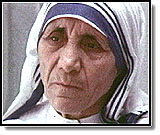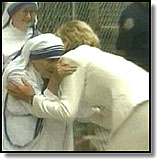
|
|
|
Mother Teresa DiesTributes have been pouring in for Mother Teresa, whose death after a heart attack was announced in India on Friday.The Vatican in Rome said Pope John Paul II was quickly informed of Mother Teresa's death, and immediately prayed for her. A Vatican spokesman said her death had touched the Pope's heart very deeply. Francis Sejerstad, the Norwegian chairman of the Nobel Committee which awarded the 1979 Peace Prize to Mother Teresa, said she had been a choice that the committee looked back on with pride. Humanitarian work, he said, had always been one of the most important criteria, and Mother Teresa had been an outstanding example of how this can be done in a self-sacrificing way. The head of the Roman Catholic church in England and Wales, Cardinal Basil Hume, said Mother Teresa had been a unique example of genuine holiness. Ordinary people around the world, he said, had been inspired by her unshakeable trust in God, her absolute commitment to the poor, and the strength of her love and humanity.
The British Prime Minister, Tony Blair, said that in a week already filled with tragedy, the world would be saddened that one of its most compassionate servants had died. Mother Teresa's spirit, he said, will live on as an inspiration to all of us. President Clinton - who is currently on holiday in the north-eastern US state of Massachusetts - described her as an incredible person. In India itself, crowds grew outside Mother Teresa's mission -- known as the Mother House, as more and more of the poor of Calcutta came to know of the death of the nun who did so much for them. They gathered outside the house to say the last farewell to the Saint of the Gutters, as she became widely known after she relinquished more conventional forms of missionary work in the 1940s and founded her own order, the Missionaries of Charity.
Inside the Mother House, sisters of the order, whose hallmark is a simple blue-edged white sari, said mass amid scenes of profound emotion. Mother Teresa had become increasingly frail in recent years, though she surprised everyone by undertaking a trip to Europe and the United States only three months ago, providing her with what has now turned out to be a last chance to meet the Pope. Her death came swiftly, shortly after she had complained of chest pains and doctors had been summoned urgently to the mother house. The Indian Prime Minister, Inder Kumar Gujral, led the tributes to Mother Teresa and her work within India by calling her an apostle of peace and love.
Though she was born of Albanian parents, India's President, K R Narayanan, described her as particularly Indian in the true spirit of the country's culture. Such a one as her, he said, rarely walked upon the earth. Mother Teresa was born of Albanian parents eighty-seven years ago. When she was 18 she joined a community of Irish nuns and went to their mission in Calcutta in 1929. Just over twenty years later she founded the Missionaries of Charity -- which over the succeeding years established hundreds of orphanages, homes for the poor and other charity centres around the world.
Mother Teresa was not without her critics. Some doctors accused her of providing haphazard medical care and not using basic medicines, like painkillers. Writing in the leading medical journal The Lancet in 1994, Dr Robin Fox commented: "Mother Teresa prefers providence to planning". In the same year, a British documentary - controversially entitled "Hell's Angel" - charged that she urged the poor to accept their fate, portraying the rich as favoured by God. Journalist Christopher Hitchens, who wrote the script, remarked: "She lends spiritual solace to dictators and to wealthy exploiters...and preaches surrender and prostration to the poor." In 1979 she was awarded the Nobel Peace Prize, one of many honours bestowed on her. She said simply that she had a special calling to help the poorest of the poor.
|
Diana, Princess of Wales, 1961-1997
Conference 97
Devolution
The Archive
News |
Issues |
Background |
Parties |
Analysis |
TV/Radio/Web
Interactive |
Forum |
Live |
About This Site
News |
Issues |
Background |
Parties |
Analysis |
TV/Radio/Web
Interactive |
Forum |
Live |
About This Site
© BBC 1997 |
politics97@bbc.co.uk |



